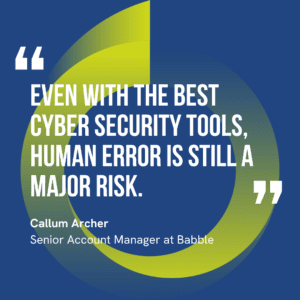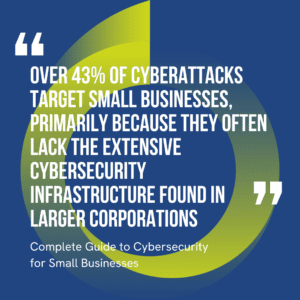Like any small business owner juggling too much at once, worrying about a cyberattack is the last thing you need. With cyber threats getting smarter and changing daily, finding the time and resources to address these threats can feel like an overwhelming task for anyone.
At Babble, we understand the unique and challenging struggles many SMBs face when it comes to cyber security – we’ve helped thousands of companies implement practical and affordable solutions that manage the protection of valuable data and systems.
In this article, we’ll guide you through the top 5 tools every SMB should use to protect their business, backed by strategies we’ve implemented with thousands of clients.
Why Cyber Security Protection Is More Crucial For SMBs Than For Enterprise
SMBs do not have the dedicated teams, big budgets, and complex security practices that bigger organisations do – and this makes them easy targets. They are impacted by cyber-attacks differently, too. Here are some of the ways an attack impacts smaller businesses:
Disproportionate Impact: When a cyber-attack hits a small business, the impact can be devastating. Disruption of operations, substantial financial loss, and irreparable damage to one’s reputation are just some of the consequences that could cripple a small business.
Resource Constraints: Many SMBs operate with limited budgets and IT staff, which makes it incredibly challenging for them to implement the same level of security that larger corporations have. This is why focusing on the essentials and prioritising solutions that offer the most impact for the best cost becomes crucial.
Shifting Threat Landscape: Smaller businesses are known to have weaker defences and the types of attacks that are being used are evolving and becoming more sophisticated and targeted compared to those that were seen just a few years ago.
But SMBs Need Different Protection
The Pareto Principle (80/20 rule) suggests that 80% of results come from 20% of effort. This principle is a good guideline when it comes to deciding which cyber security measures you should take. By focusing on the most essential cyber security tools and practices (your 20%), SMBs can achieve significant improvements in their security posture (your 80%) without breaking the bank.
If you’re unsure where to begin, here are the 5 most essential cyber security tools we recommend for every SMB.
-
MDR (Managed Detection and Response)
What it is: Think of MDR as having a 24/7 security team watching over your network. MDR providers offer continuous threat monitoring, detection, and response, using advanced technologies and expert analysts to identify and neutralise threats before they can cause harm.
How it works: MDR providers generally work with a specific cyber security software or solution provider. They ensure that the right tools are installed and managed on your network. The best part? You can have an MDR service up and running for 150-200 employees in a matter of days, giving you immediate peace of mind.
Why it matters: There is a huge shortage of cyber security professionals and businesses are not equipped to deal with threats that arise in the middle of the night or over the weekend, for example. This is where MDR comes in, giving businesses access to expertise that they need without having to hire in-house.

-
MFA (Multi-Factor Authentication)
What it is: This is one of the easiest and most effective ways to enhance your security. MFA requires users to provide multiple forms of verification to access accounts and systems. Even if a password is compromised, attackers will be stopped in their tracks without that second factor (like a code from an app or a biometric scan). Plus, MFA is becoming increasingly important for cyber insurance eligibility.
 How it works: There are a few types of MFA; biometric authentication, hardware tokens, or password-less authentication. Two-factor authentication usually involves something that a user will know, like their password, that is paired with a code generated from an app. Hardware tokens generate unique codes that allow users access, and password-less authentication relies on things such as biometrics or push notifications to access certain information and accounts.
How it works: There are a few types of MFA; biometric authentication, hardware tokens, or password-less authentication. Two-factor authentication usually involves something that a user will know, like their password, that is paired with a code generated from an app. Hardware tokens generate unique codes that allow users access, and password-less authentication relies on things such as biometrics or push notifications to access certain information and accounts.
Why it matters: Having MFA makes it that much harder for hackers to gain unauthorised access. Businesses that take out cyber security insurance will find that MFA is a requirement, and it can make the login process for employees more efficient.
-
Email Security

What it is: Email security protects corporate communication channels from threats such as targeted scams and impersonations. Email is still the number one communication channel for businesses, and it’s also a prime target for cyber criminals.
How it works: Email security works to protect your emails from being read, tampered with, or intercepted by unauthorised sources. It makes use of techniques that ensure confidentiality, integrity, and authenticity of your email communications.
Why it matters: Sophisticated phishing scams are on the rise, targeting employees with personalised messages designed to steal credentials and sensitive information. Email is still the main channel of communication that businesses use and is a prime target for attackers. Without the right email security in place, you could be moments away from being targeted in one of the simplest ways without even realising it.
-
Next-Generation Employee Training
What it is: Next-generation employee training teaches employees how to behave safely online, how to spot dodgy behaviours, and what to do in scenarios in a way that is convenient and more relevant to users compared to a boring 8-hour class.
How it works: Next-generation employee training takes a modern approach to teaching and empowering your workforce using innovative methods that are tailored to create engaging and effective training experiences.
Why it matters: Your employees are your first line of defence, but they can also be your biggest vulnerability. They are the ones who are most likely to make a mistake by clicking a suspicious link and leaving the business vulnerable. Regular, effective, and engaging cyber security training is crucial to equip your team with the knowledge and skills to recognise and avoid threats.
-
Web/Cloud Access Security (CASB)
 What it is: A CASB solution acts as an additional layer of security that focuses on keeping employees safe rather than focusing on external threats. A CASB monitors and controls employee access to websites and applications, helping prevent data leaks and malware infections.
What it is: A CASB solution acts as an additional layer of security that focuses on keeping employees safe rather than focusing on external threats. A CASB monitors and controls employee access to websites and applications, helping prevent data leaks and malware infections.
How it works: This type of security puts certain controls in place around what employees can access, click on, send, and download. It acts as an extra layer of security and protection on top of traditional cyber security tools such as antivirus software.
Why it matters: As businesses increasingly rely on cloud applications and services, it’s vital to protect your data and users when they’re accessing the internet. This is especially important for protecting sensitive information like intellectual property and customer data.

Protecting your small business from cyber threats doesn’t have to feel overwhelming. By implementing essential tools like MDR, MFA, and employee training, you’re taking significant steps to secure your business.
SMBs face unique challenges – limited resources, evolving threats, and high stakes when it comes to data protection. These five tools can help you overcome these hurdles efficiently and affordably. At Babble, we’ve helped thousands of SMBs protect what matters most. Let us guide you in safeguarding your business today.
Now that you know the essential tools, let’s talk budget. Learn how to allocate your resources effectively in our next article: ‘What Goes into a Cyber Security Budget?’





